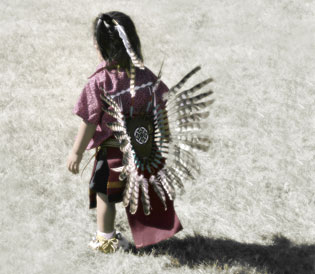 May 23-26 is Aboriginal Awareness Week. It is held on the four days following the May long weekend to increase awareness of the historical contributions, diverse traditions and cultures of Canada's Aboriginal peoples.
May 23-26 is Aboriginal Awareness Week. It is held on the four days following the May long weekend to increase awareness of the historical contributions, diverse traditions and cultures of Canada's Aboriginal peoples.
The Salvation Army embraces this culture and continues to build bridges in communities as they partner with Aboriginal Peoples across Canada. Joe Elkerton, Director of Community Ministries at The Salvation Army 614 Regent Park, is "Proud to be Chippewa." He shares his story.
There is continuous debate regarding the adaptation of the Christian message to the Aboriginal culture. Should the Church choose to embrace First Nation traditional practices? Should Aboriginal people deprive themselves of these practices to become Christians? When compared to the urgent need amongst Aboriginal people, these are small questions.
Aboriginal people make up 50% of all federal and provincial inmates; our infant mortality rate is higher than other people groups in Canada; the youth suicide rate is higher amongst Aboriginal youth versus other people groups in Canada; the life expectancy rate among Aboriginal people is 10 years below the national average; Aboriginal people continue to live in humiliating poverty. As the church looks for new mission fields both at home and abroad, one only has to watch the evening news or read one of the national papers to hear about the plight of Aboriginal people in Canada.
I find myself at times wondering about the question of faith and tradition, for I am a First Nations person with experience in many of the struggles that Aboriginal people face. I am the youngest of 11 children. My mother is Ojibwa and my father was Chippewas. Both parents struggled with alcohol and drug addiction. At a young age my brothers and sisters and I were taken by Children's Aid, thanks to the intervention of a Salvation Army family services worker. My mother went to prison for six years and my father for eight years for the neglect and abuse of my older brothers and sisters. I spent the next few years of my life in foster homes, until my one sister and I were adopted.
Like so many First Nation peoples I batttled with questions of cultural identity and dispossession. In my late teens I struggled with my own alcohol and drug abuse. Eventually I came to a saving faith in Jesus Christ in 1980, through the work of The Salvation Army.
I am not sure I can solve the complex issue of how to bring a meaningful understanding of the gospel to a people so broken and hurt. What I will offer is my opinion in light of my own role as a First Nation person who is living out my Christianity in the midst of ministry with The Salvation Army. I find myself wanting to embrace the traditional aspect of my humanity and culture as a first Nation person while living a full Christian life, and at times struggle to find the common ground.
I remember as a young Christian many years ago, a First Nation elder telling me that some day I would have to choose between being a Christian and being a First Nation person. I remember that statement with some pain in my spirit because the reality is that I am a First Nation Person by birth. I am proud to be a member of the Chippewas Nation. My people have a long and proud history here in North America. My ancestors supported and fought in many of the armed conflicts of this nation. We are a people who have endured many historical hardships, and yet we still are here growing in number and strength.
I did not convert to be a First Nation person. It is who I am. My faith and spiritual practice is a matter of choice. Many First Nations people have yet to be presented with the choice of who Jesus is. The battle for The Salvation Army is to turn the tide of discouragement and despair found in the Aboriginal communities in our nation to one of hope and promise.